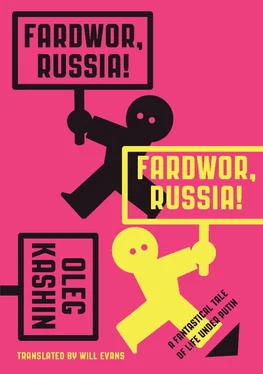This cautionary tale certainly didn’t make Marina any more optimistic, and that evening, when Karpov returned from his shack, she demanded that her husband tell her, sparing no detail, what exactly he was up to and what was fueling his dreams of fame and fortune. Karpov was unexpectedly eager to explain it—Marina even related his lecture to me, but I, having only the vaguest notion about scientific terminology, am not going to risk a game of garbled “telephone” by trying to summarize Karpov’s explanations here. I will only say that Karpov is definitely not a biologist, nor a chemist, or even a pharmacist by education, but back in Moscow he had invented some kind of serum which, when injected into living creatures, would increase their growth potential many times and the rats, which the kind Gennady had trapped for a little money at Karpov’s request, had already grown to the size of large sheepdogs, and Karpov had begun serious efforts to kill them using an electric shock, because he had still not figured out how to get the test animals to stop growing once they reached the desired size, but all the same he would figure it out, and when he did he would be able to open his own business, which would bring their family the fortune they had come here to seek. Karpov burned the dead rats in a special vat, but he skinned the fur off to then stuff them, and he could even show Marina these hides, though he doubted that she would appreciate the sight. Sure enough, she refused to go and look at the rat hides; but her husband’s story, though it was entirely convincing, for some reason didn’t calm her—she already realized what she would dream about that night, and the prospect of seeing gigantic rats in her dreams quite understandably frightened her. As she lay in bed, she wanted to tell her husband, “Let’s just leave,” but Karpov was already asleep, and she couldn’t bring herself to wake him.
She dreamed that night, but not about rats. She dreamed of Karpov’s funeral in an old cemetery (might it be the same cemetery they had passed twice?), and she was there—young, as she was now, but somehow very different, a stranger to herself. She had been afraid to awaken Karpov, but he woke her up and showed her that her pillow was wet—it seems that she had been crying in her sleep. While Marina was thinking up something to say to her husband about the source of these tears, Karpov fell asleep. Marina wiped away her tears and fell back asleep herself, this time without any dreams.
IN THE MORNING the doorbell rang; Marina opened the door. Just as on their first day there, Gennady had come over with some milk. From Auntie Katya, Marina had learned that Gennady was a war veteran on a pension; his parents had lived here, and when he retired from the army, unmarried and good-for-nothing, he moved back to live with them in 1991. His parents died shortly thereafter, and now Gennady lived alone raising chickens and, more importantly, serving as a kind of keeper of the local traditions which had almost completely died out. He contributed to the spread of news and gossip throughout the town, showed visitors the ropes—the way things were done around here—giving instructions to teenagers and drivers parking improperly—in general, he kept the town from turning into a random collection of suburban five-story, Soviet apartment buildings in the middle of the steppe.
For example, this time he had brought not only milk but also an important communication: the director of the institute, an associate member of the Russian Academy of Natural Sciences, Elena Nikolaevna Gorskaya, whose birthday was today, would be pleased to see Mr. Karpov and his wife at her party that night, even though she couldn’t remember Karpov’s grandfather, she had no doubt that his grandson was a fine man who would undoubtedly become a friend of all the employees at the institute.
When Marina relayed this message to her husband, he immediately said that he would not be going to any birthday party, that he was planning an important experiment, and he was not about to sacrifice it for the sake of a bunch of strangers who just wanted to gawk at him. But Marina explained to Karpov that he was an idiot and if he wanted to live here for even a month, then he had to build the right relationships with the locals, both the local dignitaries as well as ordinary people, and if they want to see him, he should meet them halfway, or else they would point the finger at him. For some reason this argument about “pointing the finger” impressed Karpov; he wearily asked if he needed to put on a suit, and Marina began to laugh; in short, the incident was settled.
The path that led from their home to the institute was paved with yellow coquina shell and lined on the left and the right with blue spruce trees planted by the Regional Committee, which indicated that at one time everything at the institute had been well and good. The path was no more than a hundred meters long, it took just a minute and a half to walk it, but the Karpovs, of course, were late all the same. Marina was certain that it was her husband’s fault: he had taken forever in the shower washing off the rat smell; while Karpov thought that Marina had taken too long putting on her make-up. Despite that, neither husband nor wife was mad at the other because, for all intents and purposes, who would care if they were late to a voluntary gathering? It’s not like it’s a plane to catch, after all.
When they walked into the assembly hall of the institute, from the stage of which a fat man in glasses was reading a speech on the scientific achievements of the esteemed Elena Nikolaevna (listening to the mumbling of the fat man, Karpov quickly realized that the director had not achieved anything of particular merit), the audience in the hall—people who clearly knew each other well and had for a long time—of course, immediately shifted their attention to the couple, and Marina felt uncomfortable under the gazes of a hundred and fifty pairs of eyes, with every pair attached to a mouth suffering from a lack of gossip. Marina knew that the next day kind Gennady would tell her everything that the institute’s women thought about her dress and her hair, and Karpov, apparently, also felt something similar, because at one point he took his wife’s hand and gave it a little squeeze, as if to say, “Don’t worry.”
Meanwhile, the fat man relinquished his place on the stage to a Cossack choir which apparently consisted of scientists from the institute, because the caps and tunics they wore did not necessarily go very well with the bespectacled countenances of the singing men, and plus their out-of-tune singing indicated that these Cossacks hadn’t learned to sing at home but rather from going to see a national festival of historical song and dance. They sang to Elena Nikolaevna’s health, but the only phrase distinguishable in their song was her name, which was repeated obsessively in the chorus. The audience clapped more enthusiastically for the Cossacks than for the speaker, who, as Marina had already learned from a conversation between two women sitting behind her, was named Vyacheslav Kirillovich, and he headed up not just any department, but nanotechnology, which in its turn served as a sign of the institute’s progressive nature and its director in particular.
The fact that Elena Nikolaevna was a progressive and modern woman became apparent to Karpov at the banquet in the winter garden after the ceremonial part of the evening (naturally, not everyone was invited, but the Karpovs were dragged there—“You absolutely must!”—by a pretty young blonde girl with huge fake nails—probably a secretary). Not knowing anybody, Karpov and Marina felt uncomfortable and saved themselves by relating some banal tales of life in Moscow, of which they had a lot that they hadn’t shared with anybody before; their stories were of the types of thing that were commonplace in Moscow, but in this winter garden it all sounded like stories of extraterrestrial life; and Marina, who still hadn’t made up her mind whether she liked being an extraterrestrial, reminisced to her husband about Moscow’s taxi drivers and waitresses, colleagues and superiors, about some people she knew who were unfamiliar to Karpov, and even he began to miss that city from which had been so eager to escape just two weeks prior.
Читать дальше




![Stephan Orth - Behind Putin's Curtain - Friendships and Misadventures Inside Russia [aka Couchsurfing in Russia]](/books/415210/stephan-orth-behind-putin-s-curtain-friendships-a-thumb.webp)






